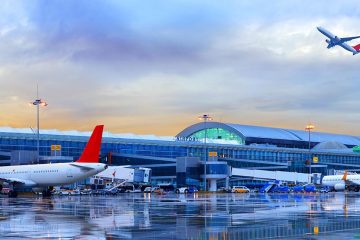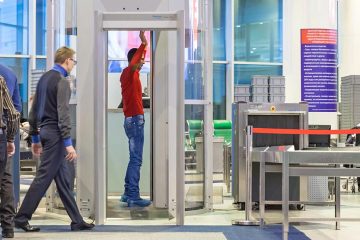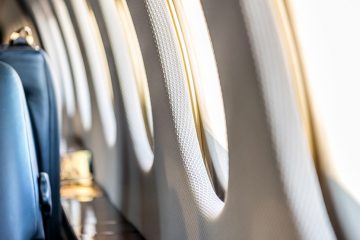Everything You Need to Know About Flying with Your Baby
The Most Asked Questions About Flying with Your Littlest Family Member
The first flight with your little one can be a bit of a daunting task. As you step into this uncharted territory, you may find yourself considering things you never thought of before you were a parent. We’ve tackled some of the most common questions people have about flying with a baby to help ease your mind and have your little one racking up the frequent flyer miles in no time!
How Old Does a Baby Have to Be to Fly?
The first question many people may ask is, “Is my baby even old enough to fly?” It’s sooner than you might actually think. Many airlines will allow your newborn to fly as early as 2 days old! However, some will insist that the child be 2 weeks old. Of course, for an international flight, your child would need a passport, so you’d have to wait at least until you have that in hand.
As far as whether you should actually consider taking your newborn on a flight, that’s a personal choice. Many physicians recommend waiting until the child is at least 2 months old to avoid exposing their brand new immune systems to unnecessary germs, so you may want to avoid non-essential travel for a bit.
Does Your Baby Need a Passport or Other Identification to Fly?
For international flights, the answer to this question is an obvious one. Yes, of course they will need to get a passport. However, what about domestic flights? Airlines, and even many airports, require identification of some sort for all passengers. If they don’t have a photo ID, a birth certificate is the typical form of identification used for boarding a flight.
If you are traveling with an adopted child and your name is not listed on the birth certificate as a parent, it is wise to also bring along your adoption papers to verify that you are the legal guardian of the baby. Make sure everyone in your group has the proper identification before you fly to avoid having your trip delayed or cut short!
Another note here is that if you are traveling with your baby without the other parent or legal guardian, it is wise to have the other parent write a letter of consent for you to travel alone with the child. We’ve never been asked for this on many many flights alone with my daughter, but I’ve heard stories of customs officials and airline employees asking for such a document, so we always carry it with us just in case!
Does my Baby Need a Seat?
On virtually all airlines, babies under the age of 2 fly free or at a steeply discounted rate if they sit on the parent’s lap. Many airlines in other countries will provide infant seat belts that attach to the parent’s lap belt for use during the flight. However, we haven’t found this to be a common practice in the United States.
If you’d like your child to fly in their car-seat, you will need to buy them a seat. Check with your individual airline for pricing details as some airlines will offer a rate for “infants in a seat” whereas others (often discount airlines) charge the same rate regardless of the age of the person occupying the seat.
In order to take your car-seat on board you will need to make sure that the car-seat is FAA approved and that the label that says so is still attached and visible. Flight attendants will often check for the label, so if you don’t have it you could run into problems. You should also check to make sure your seat is narrow enough to install easily on the plane you will be flying in.
Do I Have to Buy a Ticket for My Baby?
As we mentioned above, babies fly free or very cheaply on many flights provided they sit on your lap. However, your child will still need to be added to the flight. If you are unable to add the baby at the time of booking, you will need to contact your airline by phone to make sure the infant is on the itinerary.
Taking a Viking Homelands cruise will grant you the opportunity to experience some of the best cuisine of Scandinavia, without ever leaving the ship.
How Will Flying Affect My Baby’s Ears?
Even as adults, flying can sometimes be uncomfortable on our ears as they pop and adjust to the changes in elevation. For infants and young kids this is especially true as they aren’t used to the sensation. It may even scare your child.
In babies, their narrow Eustacian tubes can make it more difficult for their ears to adjust to the pressure changes, especially if they have an ear infection or a cold. Typically they will still open though, and even if it’s a bit painful, the discomfort is not long lasting. Usually nursing, drinking from a bottle or chewing on a snack (for older babies) will help your baby’s ears adjust more easily.
When my daughter was a baby, I always nursed her on take-off and landing and it seemed to make the experience much more comfortable for her. If your child does have a bad ear infection, double check with your doctor about flying as they may recommend that you delay the trip to avoid any long-term harm.
Can I Bring Breast Milk, Formula, Baby Food etc. on the Plane?
Different countries have different rules about what liquids are allowed when flying. When flying in the United States, you can double check the requirements on the Transportation Security Administration website.
Every country we’ve traveled through with kids (more than 20 at this point) has allowed us to fly with formula, breast milk and baby food, even in quantities over 3.4 ounces (100 milliliters) that other liquids are usually limited to. You will usually have to present them for a separate screening which can take a bit more time, so give yourself plenty of time to get through security.
In most cases you won’t have any difficulties flying with canned, jarred and processed baby food, formula, breast milk, liquid-filled teethers and the like.
We hope we’ve relieved some of your concerns about flying with babies and that you will soon be well on your way to booking your infant’s first flight! Happy travels!









